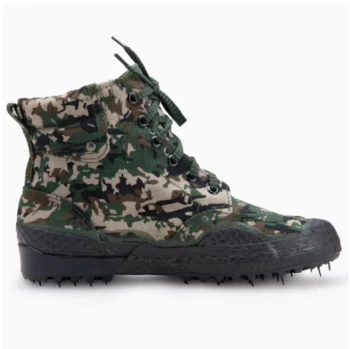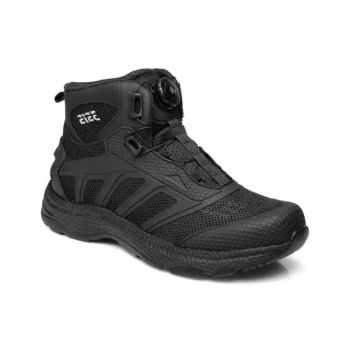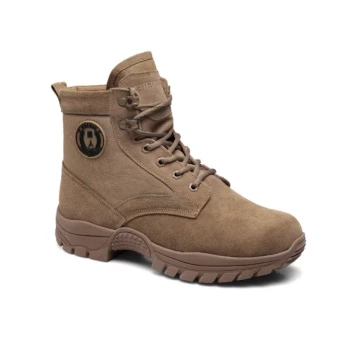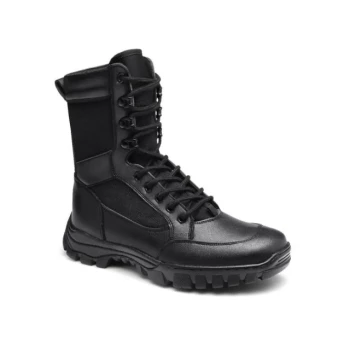To effectively manage scent on your hunting boots, you must adopt a multi-stage system that includes dedicated use, consistent treatment with scent eliminators, proper drying with powders, and isolation in sealed storage between hunts. This process minimizes the human odor you deposit directly onto the ground, which is the most common way game animals detect a hunter's presence.
Your boots are the single most critical piece of scent control gear because they create a direct scent trail on the ground. Treating them isn't a one-time action but a constant process of minimizing contamination from your home to your hunting spot.
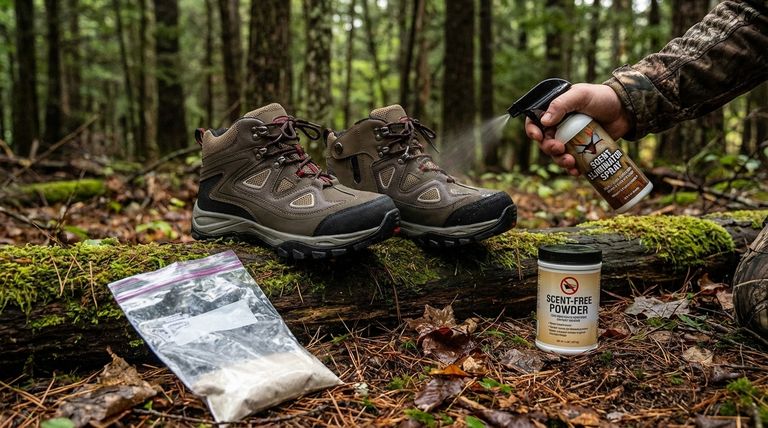
Why Your Boots Are a Scent Hotspot
Understanding why your boots are such a liability is the first step to managing them. They are a primary vehicle for leaving behind a scent signature that alerts and alarms wildlife.
Direct Ground Contact
Every step you take presses your scent into the soil, leaves, and vegetation. This creates a clear trail that animals with sensitive noses can easily follow or cross, immediately signaling danger.
Trapped Sweat and Bacteria
Your feet produce a significant amount of sweat, which is odorless on its own. However, this moisture creates the perfect environment for bacteria to thrive, and it's the waste from this bacteria that produces a strong, distinct human odor.
Absorption of Foreign Scents
Beyond your own body odor, boots readily absorb foreign scents from your daily life. Gasoline from a gas station, food odors from your truck, or pet dander from your home are all unnatural and alarming scents in the wild.
A Systematic Approach to Boot Scent Control
Effective management requires a disciplined process that addresses scent at every stage of your hunt: before you leave, while you're in the field, and after you return.
Phase 1: Preparation and Treatment
Before each hunt, treat your boots thoroughly. Start by spraying them inside and out with a high-quality, enzyme-based scent elimination spray. This neutralizes existing odor-causing bacteria.
After they are dry, lightly dust the inside with a scent-free powder. This helps absorb sweat and prevent new bacteria growth during your hunt.
Phase 2: Strategic Storage
How you store your boots is as important as how you treat them. Never wear them in your house, car, or to run errands.
When not in use, they should be stored in a sealed, scent-free plastic tub or a durable scent-control bag. This isolates them from the ambient odors of your garage, home, or vehicle.
Phase 3: In-the-Field Management
The final step is managing scent as you approach your hunting area. Avoid walking through contaminated areas.
As a final measure, consider using natural cover scents by walking through a muddy puddle, a creek, or a patch of crushed pine needles near your stand. This can help mask any remaining rubber or human odor with a familiar environmental smell.
Common Pitfalls to Avoid
Even with a system, common mistakes can undermine your efforts. Being aware of these pitfalls is crucial for maintaining a low scent profile.
Over-Relying on Sprays
Scent-eliminating sprays are a tool, not a magic solution. They cannot overcome a boot that is already saturated with foreign odors from being worn to a gas station or fast-food restaurant.
Neglecting Your Laces
Boot laces are highly porous and act like wicks, absorbing sweat from inside the boot and scents from the environment. Be sure to spray them down thoroughly during your treatment phase.
Forgetting the Journey
Putting on "clean" boots and then driving to your spot can be a critical error. The floor mats and pedals in your vehicle can easily re-contaminate your soles before you even step into the woods. Change into your boots only when you arrive at your hunting location.
Applying This to Your Hunt
Your specific strategy should align with your hunting style and environment.
- If your primary focus is stand hunting: Your goal is a completely scent-free entry and exit, so meticulous pre-hunt treatment and changing into boots at your parking spot is paramount.
- If your primary focus is stalking or still-hunting: You must prioritize continuous scent masking, making in-field tactics like using mud or creek water just as important as your initial prep.
- If your primary focus is a multi-day backcountry hunt: Your goal is field-expedient maintenance, so carrying a travel-size spray and ensuring boots can air out and dry overnight is critical.
Ultimately, disciplined scent control for your footwear transforms it from your biggest liability into a neutral piece of equipment.
Summary Table:
| Phase | Key Action | Purpose |
|---|---|---|
| 1. Preparation | Spray with scent eliminator; dust with powder. | Neutralize bacteria; absorb sweat. |
| 2. Storage | Isolate in a sealed, scent-free container. | Prevent contamination from foreign odors. |
| 3. In-Field | Use natural cover scents; change boots on-site. | Mask remaining odor; avoid re-contamination. |
Ready to upgrade your hunting gear with boots built for performance and scent control?
As a large-scale manufacturer, 3515 produces a comprehensive range of high-quality hunting and outdoor footwear for distributors, brand owners, and bulk clients. Our production capabilities encompass all types of durable, comfortable boots designed to meet the rigorous demands of hunters.
Contact us today to discuss your footwear needs and discover how we can be your reliable manufacturing partner.
Visual Guide
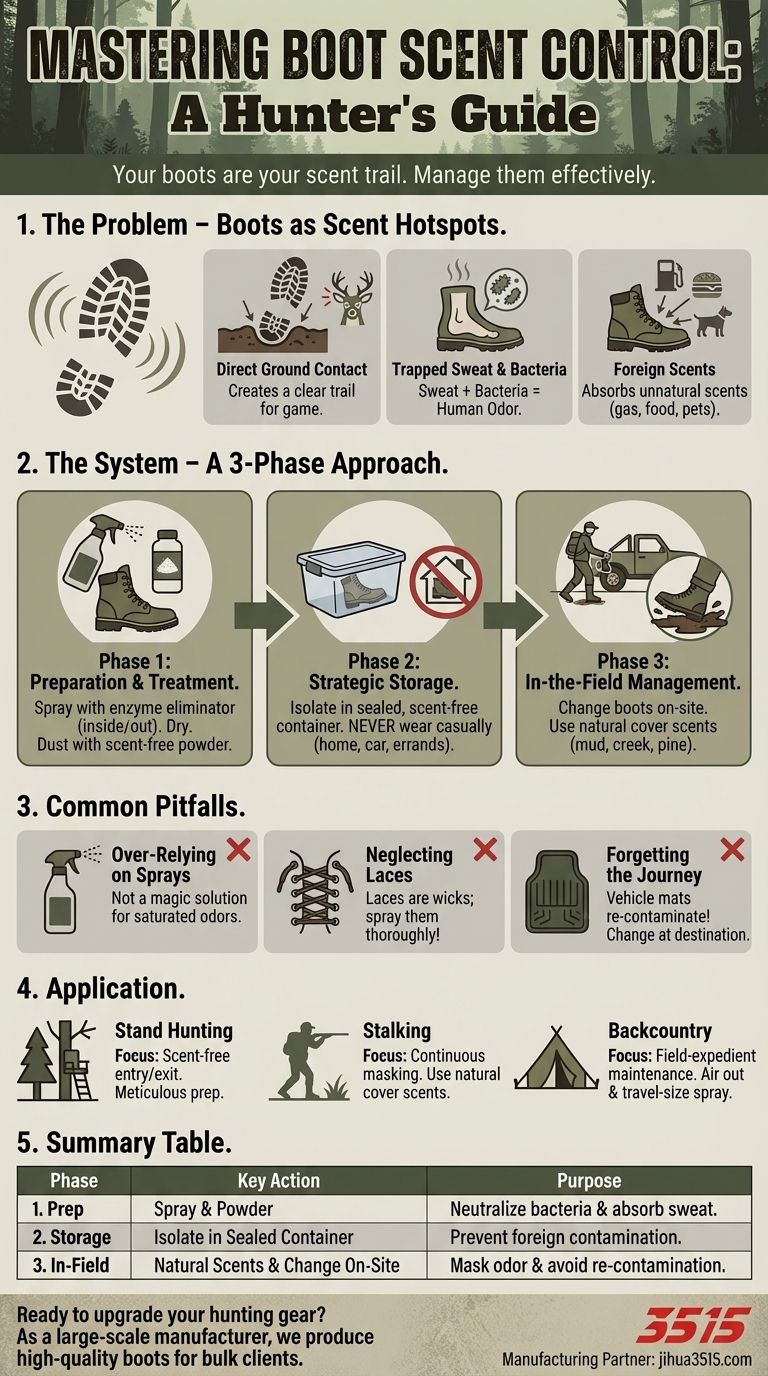
Related Products
- Safety Footwear Wholesale Manufacturer for Custom OEM/ODM Production
- Durable Spiked Camouflage Boots Wholesale & Factory Production
- Wholesale Waterproof Tactical Boots Custom Suede & High-Traction Soles
- Wholesale High-Traction Camo Boots - Custom Manufacturer for Brands
- Customizable Anti-Smash Safety Boots for Wholesale & Private Label Manufacturing
People Also Ask
- What are the characteristics of day-hiking boots? Find the Perfect Balance of Support & Agility
- Why is durability important in snowmobile boots? Essential for Safety and Performance
- What types of walking braces are available? Choose the Right Support for Your Injury
- What materials are used to make winter boots to keep feet warm and dry? A Guide to the Essential Layering System
- What is the historical background of the Clarks Desert Boot? From WWII Inspiration to Style Icon
- What are backpacking boots designed for? Ultimate Support for Heavy Loads
- How does the recording of walking aid usage assist in evaluating mobility? Improve Fall Risk Assessments Today
- When should you contact a doctor while using a walking boot? Recognize the warning signs.

